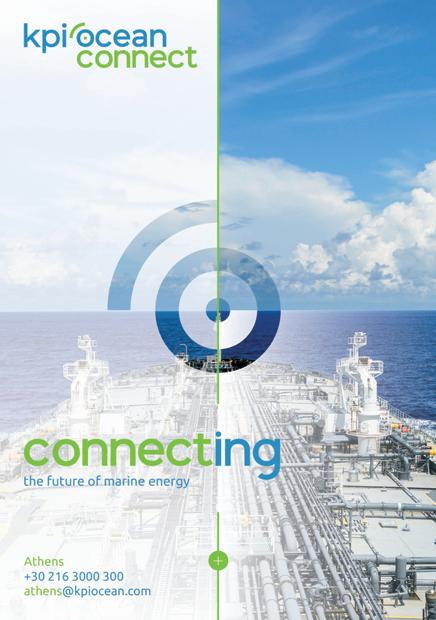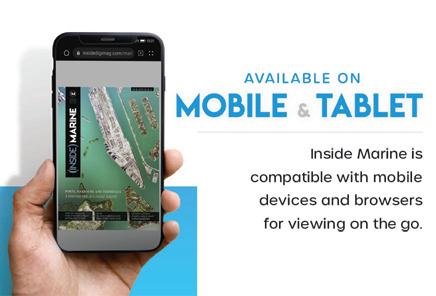AT THE



PYXIS TANKERS I PROFILE
Focused on medium range product tankers, Pyxis Tankers owns a modern fleet engaged in the seaborne transportation of refined petroleum products and other bulk liquids. CEO Valentios Valentis outlined the challenges and opportunities for the company and the broader industry, in a review with Phil Nicholls.

Recent global events have thrown a series of challenges into the path of the shipping industry. It takes an agile company to navigate these difficult waters and plot a safe course into an unknown future.

“Shipping is at the crossroads of major changes,” explained CEO Valentios Valentis. “Zero-emission shipping is on the way, which means strict new regulations and, of course, technological advancements. Therefore, we need to be ready to embrace change Our industry should stand united and collaborate closely to ensure a smooth transition for the benefit of all shipping companies, liners or tramp, big or small.”
Pyxis Tankers is no stranger to the challenges of the sector. Formed in 2015 through a reverse take-over of a small company, Pyxis immediately endured almost six years of difficult market conditions. Starting in early 2020, however, an operating and financial restructuring plan enhanced the company’s competitive position, which was subsequently boosted by a substantial improvement in the tanker chartering environment in 2022.
Headquartered in Maroussi, a northern suburb of Athens, Pyxis operates a fleet of five eco product tankers which carry a broad range of refined petroleum products and edible oils. These medium range product tankers (MR2s) were all built in South Korea and have an average carrying capacity of 50k dwt and an average age of 9 years.
“The number of our onshore personnel is small, given the size and nature of our operations,” Mr Valentis said. “International Tanker Management Ltd (ITM) is the technical manager of our fleet, providing crewing and on-board vessel operations. Overall, our operations are efficient and scalable.”
When attractive opportunities develop in the market, Pyxis expects to scale up the fleet by acquiring modern eco-efficient MR2s. This follows the recent sale of an old non-eco MR2 and two
non-core small tankers. Last year, Pyxis acquired 2013- and 2017-built product tankers. The ongoing fleet evolution will afford many operational benefits and meet growing customer needs.
Charting the business
Pyxis Tankers is publicly traded on Nasdaq (PXS). In the third quarter of 2022, the company generated net revenues of over $17 million, the adjusted EBITDA equating to about $8m and net income in the region of $5.3m.
These results were substantially better than the comparable period in 2021, primarily due to changes in fleet composition and dramatically higher spot charter rates. Chartering conditions continue to be strong for Pyxis, where the daily time charter equivalent rate (TCE) per MR increased from $29,062 in Q3 to a preliminary bookings rate of $36,800 for Q4, 2022.
“Our vessels operate worldwide and trade all designated MR routes,” Mr Valentis said. “The war in Ukraine, the upcoming winter season, low product inventory levels (especially in Europe), and the announced EU embargo of refined product exports from Russia starting in February 2023 - all these factors create dislocations in the global market.
“The result is higher charter rates, increased ton-mile demand and arbitrage opportunities. Everything points towards a high-rate environment, at least in the short term, but also higher volatility.”
Mr Valentis remains confident in the Pyxis business model operating in this volatile global market: “Pyxis owns and operates only Eco-MR2’s which are employed under a mixed chartering strategy of spot voyages and time charters. Spot voyages provide upside revenue opportunities in rising markets; time charters deliver stable, visible cash flows.





PYXIS TANKERS I PROFILE
“Given the nature of Pyxis’ operations, the company has a long list of suppliers and service providers around the world. Many of these vendors have been supplying Pyxis for several years, frequently on a repeat basis”
“The company management owns around 55% of the outstanding common shares of Pyxis; we have continuously invested in our own company, in order to enhance shareholder value.”
Strong partnerships
Continued efficient operation in these circumstances requires close relationships with suppliers and partners. Given the nature of Pyxis’ operations, the company has a long list of suppliers and service
providers around the world. Many of these vendors have been supplying Pyxis for several years, frequently on a repeat basis.
Supported by these business partnerships, Pyxis is strongly positioned to weather the latest round of changes within the shipping industry, according to Mr Valentis: “The shipping industry is highly regulated under numerous international, national and local rules covering vessels, operations and maintenance. Moreover, our charterers, who consist of large integrated and national oil companies, major trading firms and

refiners, have rigorous vetting requirements for a vessel’s condition and operation.
“Industry regulations, especially environmental, are increasing. Pyxis Tankers is committed to good ESG standards. These are periodically reviewed by the Board, which is comprised of a majority of industry experienced independent members.”
Core to these industry-wide changes is a drive towards greater sustainability. The eco vessels operated by Pyxis deliver reduced fuel consumption, plus lower emissions and running costs. The company has installed ballast water treatment systems and upgraded its oldest vessel, built in 2009, by installing fuelsaving devices.
“Regarding the upcoming IMO environmental regulations,” continued Mr Valentis, “such as CII and EEXI, our studies are complete and our vessels will soon have the designated ratings in order to fully comply by January 1, 2023.”
A future course
The nature and complexity of the international seaborne transportation of refined petroleum products remains management intensive. The team at Pyxis has the requisite experience to handle a broad range of issues.

“In the short-term, product tanker industry conditions should remain robust,” Mr Valentis said. “Long-term supply/demand funda-
mentals look positive for the next couple of years, save a massive global recession. We try to mitigate risk by emphasising quality and reliability in operations and diversified chartering employment. Good financial controls and interest rate hedging are also important components of our company.”
Regarding the future, Pyxis plans to further improve its financial position in the short-term, allowing the company to take advantage of strategic opportunities as they arise. The recent significant appreciation in second-hand tanker values has proved a double-edged sword, as vessel acquisitions became very expensive, especially for modern tonnage. Pyxis looks forward to expanding as a company when the timing is judged right.
“I love ships,” concluded Mr Valentis, “and the freedom and entrepreneurial spirit of the marine business. Also, Pyxis being a publicly listed company has given me another responsibility and purpose - to ensure that shareholder’s interests are closely aligned with the management team and that value is created and enhanced. There is never a dull day in shipping!” n

